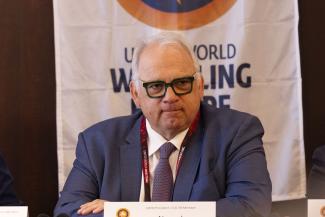Paris Olympics: Wrestling breaks new barriers, expands reach across continents
Thursday, August 22, 2024 - 14:05 By United World Wrestling Press

CORSIER-SUR-VEVEY, Switzerland (August 22): More than half a million new fans in the digital community. An astounding 100 million engagements. And a remarkable 134 percent increase in social media impressions compared to Tokyo 2020.
At the Paris Olympics, it was a gold medal for wrestling.

On the mat, legends were born, records were set, and some moments would be remembered for ages. Off it, the sport broke new barriers, expanded its reach and engaged with a diverse audience as the United World Wrestling digital channels witnessed unprecedented growth during the Games.
The UWW’s online platforms recorded an impressive 11.2 percent increase in followers, adding over 508,000 new fans to its digital community. Compared to the growth in followers during the Tokyo Olympics, this figure represents a staggering 125 percent increase.
A large part of this surge was seen on Instagram, where the UWW gained 217,000 new followers. Facebook was a close second, adding 183,000 new followers while TikTok, the platform known for its short, engaging content, added 61,400 new followers. The growth across all platforms highlights the effectiveness of the UWW’s content strategy.
The inspiring clip of Greco-Roman star Mohammadhadi SARAVI (IRI), who won Iran’s first gold medal in the Paris Olympics drove the maximum engagement on Instagram. Saravi, who won a bronze medal in Tokyo, beat Artur ALEKSANYAN (ARM) 4-1 in the 97kg final.
Another Iranian, Rahman AMOUZAD, one of the most feared wrestlers in the 65 kg freestyle, went viral with a video in which he proclaimed himself the ‘king’. This post had the second-highest engagement while a slick clip of Frank CHAMIZO (ITA) was the third-most viewed, captivating the viewers and leading engagements as well as interactions.
These videos – and many others shared across UWW’s social media channels – resonated strongly with audiences, garnering record-breaking views. Overall, there were 330 million impressions, a remarkable rise of 134 percent compared to the Tokyo Olympics.
Moreover, the content also achieved 100 million engagements, and a 71 percent increase in reach compared to the previous Olympic Games. This surge in interaction underscores the high level of interest and excitement generated by UWW’s coverage of the Olympic wrestling events.
The video content drove UWW’s social media success. Across all platforms, UWW’s video content garnered over 156 million views, an extraordinary 205 percent increase compared to the Tokyo 2020 Olympics.
YouTube, in particular, saw significant traction with over 21 million views. This success was fueled by a mix of short and long-form videos apart from live streaming, with shorts emerging as the most popular content format.
With more than one million views, the YouTube video of AMAN (IND) getting his revenge over Zelimkhan ABAKAROV (ALB) with a win in the preliminary round. Aman, who won a bronze medal, had lost to Abakarov at the 2023 World Championships.
Chamizo’s video, Don't play with fire #WrestleParis, which went viral on Instagram was also a huge hit on YouTube with hundreds of thousands of viewers, making it the second-most watched video on the platform.
The Day Three highlights show which revisited one of the biggest upsets of the competition – Vinesh PHOGAT (IND) defeating Yui SUSAKI (JPN) in the women’s 50 kg first round – got the third-highest views on YouTube.
The UWW’s vibrant social media strategy was complemented by a robust email marketing campaign, which ran daily throughout the Olympic Games. The ongoing CRM campaigns helped boost engagement across Web, App and UWW+.


Share your thoughts.
Comments